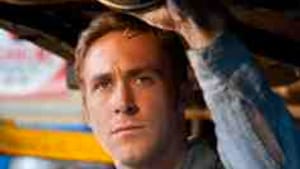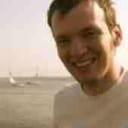Stay in the Loop
BSR publishes on a weekly schedule, with an email newsletter every Wednesday and Thursday morning. There’s no paywall, and subscribing is always free.
A protagonist who's seen too many movies
"Drive': Beyond casual violence

Drive, the neo-noir Nicolas Winding Refn film, doesn't swagger or strut. It slides smoothly along, pausing only for a few moments of sudden, shuddering violence. And it's these moments (which aren't fun to watch) that keep Drive from degenerating into a popcorn gangster flick.
With its tense, minimalist opening scene, its flamboyant pink title lettering, pulsing electronica soundtrack and minimalist dialogue, Drive simply seems enjoyably hip at first. The first third of the film unfolds as an essentially sweet story of a taciturn young man who befriends a beautiful mother and her young son.
Ryan Gosling plays a mechanic and automotive stuntman who sidelines as a getaway driver. The preternaturally enchanting Carey Mulligan plays his neighbor, Irene, with whom he develops a bond, although her husband will soon be released from prison. The chemistry between Mulligan and Gosling is palpable, which is essential because the script is pretty light on dialogue and mostly just leaves them to smile longingly at each other.
The rest of Drive's world is comprised of small-time crooks and thugs, including a truly creepy Albert Brooks (massively cast against type) as a mid-level Jewish mobster.
First hint of violence
At about the 45-minute mark, Gosling's unnamed Driver is sitting in a diner, eating (but hardly tasting) a slice of pie, when an old criminal acquaintance sidles up and starts talking business. The camera swoops in on Driver's face as he quietly says, "How about this: You shut your mouth or I'll kick your teeth down your throat and shut it for you."
At this point we've never seen this side of the character. He's never even hinted at violence before. But soon thereafter he's dishing it out in all sorts of unpalatable ways.
As the rest of the film unfolds, it becomes clear that Driver is a psychopath. Unlike Michael Mann's cold professional criminals (in Miami Vice, Public Enemies, etc.) or Clint Eastwood's Man With No Name, in Drive we see the stoic and deadly anti-hero interact sweetly with a woman and her child before you witness him gruesomely dispatch his foes. This contrast renders the latter scenes all the more chilling. After you see what he's capable of, you don't want him around Mulligan or her kid.
At the film's end, you feel relief that he can't be with her. His barely emotional stoicism doesn't just seem cool any more. It's downright scary.
A sweet kiss, then…
This menacing sense is encapsulated in the elevator scene, where Driver rides down to his apartment building's garage with Irene and a hit man. Driver notices the gun beneath the other man's jacket, subtly moves Irene out of the way, kisses her sweetly, and then proceeds to punch the thug to the ground and viscerally stomp his head into mush. (The sound effects are sickening.)
Irene, who didn't see the other man as a threat, stares at Driver in stunned horror as the elevator doors close between them. All the beautiful moments they've had together don't mean anything after that.
A "'real human'?
In a recent interview, Gosling described his character as "somebody who's seen too many movies. He's confusing his life for a film, and he's made himself the hero of his own action film. He's just kind of lost in the mythology of Hollywood."
That seems right. Driver gets to be a badass like Clint Eastwood, he gets to save the girl, but he's still kind of Travis Bickle-creepy. He doesn't seem like "a real human being and a real hero," as his theme song croons. The violence he metes out isn't clean or easy. It's disturbing (and very not-Hollywood).
This isn't to say that Drive is so disquieting as to be unpleasant. (I saw it twice.) But while the film may deserve the "cool" verdict bestrode on it by many critics, it offers something beyond the casual violence of your typical action film. It's also itself a commentary on action movies. Or maybe a warning, to wit: You really don't want to make yourself the hero of one.♦
To read a response, click here.
With its tense, minimalist opening scene, its flamboyant pink title lettering, pulsing electronica soundtrack and minimalist dialogue, Drive simply seems enjoyably hip at first. The first third of the film unfolds as an essentially sweet story of a taciturn young man who befriends a beautiful mother and her young son.
Ryan Gosling plays a mechanic and automotive stuntman who sidelines as a getaway driver. The preternaturally enchanting Carey Mulligan plays his neighbor, Irene, with whom he develops a bond, although her husband will soon be released from prison. The chemistry between Mulligan and Gosling is palpable, which is essential because the script is pretty light on dialogue and mostly just leaves them to smile longingly at each other.
The rest of Drive's world is comprised of small-time crooks and thugs, including a truly creepy Albert Brooks (massively cast against type) as a mid-level Jewish mobster.
First hint of violence
At about the 45-minute mark, Gosling's unnamed Driver is sitting in a diner, eating (but hardly tasting) a slice of pie, when an old criminal acquaintance sidles up and starts talking business. The camera swoops in on Driver's face as he quietly says, "How about this: You shut your mouth or I'll kick your teeth down your throat and shut it for you."
At this point we've never seen this side of the character. He's never even hinted at violence before. But soon thereafter he's dishing it out in all sorts of unpalatable ways.
As the rest of the film unfolds, it becomes clear that Driver is a psychopath. Unlike Michael Mann's cold professional criminals (in Miami Vice, Public Enemies, etc.) or Clint Eastwood's Man With No Name, in Drive we see the stoic and deadly anti-hero interact sweetly with a woman and her child before you witness him gruesomely dispatch his foes. This contrast renders the latter scenes all the more chilling. After you see what he's capable of, you don't want him around Mulligan or her kid.
At the film's end, you feel relief that he can't be with her. His barely emotional stoicism doesn't just seem cool any more. It's downright scary.
A sweet kiss, then…
This menacing sense is encapsulated in the elevator scene, where Driver rides down to his apartment building's garage with Irene and a hit man. Driver notices the gun beneath the other man's jacket, subtly moves Irene out of the way, kisses her sweetly, and then proceeds to punch the thug to the ground and viscerally stomp his head into mush. (The sound effects are sickening.)
Irene, who didn't see the other man as a threat, stares at Driver in stunned horror as the elevator doors close between them. All the beautiful moments they've had together don't mean anything after that.
A "'real human'?
In a recent interview, Gosling described his character as "somebody who's seen too many movies. He's confusing his life for a film, and he's made himself the hero of his own action film. He's just kind of lost in the mythology of Hollywood."
That seems right. Driver gets to be a badass like Clint Eastwood, he gets to save the girl, but he's still kind of Travis Bickle-creepy. He doesn't seem like "a real human being and a real hero," as his theme song croons. The violence he metes out isn't clean or easy. It's disturbing (and very not-Hollywood).
This isn't to say that Drive is so disquieting as to be unpleasant. (I saw it twice.) But while the film may deserve the "cool" verdict bestrode on it by many critics, it offers something beyond the casual violence of your typical action film. It's also itself a commentary on action movies. Or maybe a warning, to wit: You really don't want to make yourself the hero of one.♦
To read a response, click here.
What, When, Where
Drive. A film directed by Nicholas Winding Refn. At University City 6, 230 South 40th St. (215) 386-0869 or movies.eventful.com.
Sign up for our newsletter
All of the week's new articles, all in one place. Sign up for the free weekly BSR newsletters, and don't miss a conversation.

 Jake Blumgart
Jake Blumgart